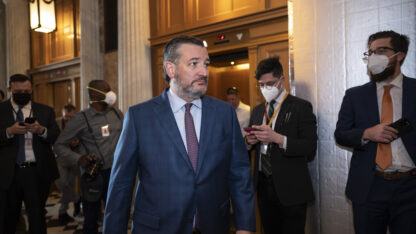When President Obama travels to Colombia this weekend for the Summit of the Americas, he’ll be stepping into a vigorous debate about the drug war that could be awkward for the United States.
Some Latin American leaders, who also happen to be strong U.S. allies, say the American-sponsored war on drugs is failing and that new options need to be considered.
One proposal they want to discuss is legalizing some drugs — a move the U.S. strongly opposes.
Over the past four decades, the drug war has become increasingly bloody, and violence is now numbingly common across much of Central America and northern Mexico.
That’s prompting widespread disenchantment with the current approach –- which involves widespread prosecution of drug users and military-style tactics against drug gangs.
The campaign started with former President Richard Nixon, who said: “We must wage what I have called total war against Public Enemy No. 1 in the United States: the problem of dangerous drugs.”
Since then, that war has been taken to the drug cartels across the Americas, with heavy U.S. funding.
Looking For New Options
But now, some presidents, including Colombia’s Juan Manuel Santos, are asking if there isn’t another way.
Santos told NPR he’s putting the issue up for debate at the Summit of the Americas in the Colombian coastal city of Cartagena. Obama will be one of more than 30 leaders at the summit.
“It’s been the same approach and the same policies,” Santos said. “And where are we? This is what we have to ask ourselves. Are we in the ideal place? Or should we at least contemplate alternatives?”
Santos is no critic of the United States. He’s one of Washington’s closest allies and a former defense minister known for his hawkish reputation on security issues.
And he’s not the only one proposing a new approach.
The most forceful proponent of that line has been Guatemalan President Otto Perez, a former military man who has fought traffickers for years.
After taking over the presidency earlier this year, Perez told NPR that he came to the conclusion that the drug war is failing. Drug trafficking has expanded and corruption has tainted government institutions, including the judicial system.
He says as long as such big demand for cocaine exists in the U.S., drug trafficking will continue.
U.S. Officials Oppose Legalization
American officials declined to comment on the record. Privately, they said that U.S. efforts in Colombia over the past decade have reduced cocaine production, and that cocaine consumption in the U.S. has fallen.
Vice President Joe Biden has said publicly that while the U.S. will debate with Latin American presidents at the summit, there is no possibility that the administration will shift gears on drug legalization.
Ethan Nadelmann, who directs the New York-based Drug Policy Alliance and has advised some Latin American leaders, says what those leaders want to debate is more nuanced.
“They’re not saying legalize everything today, like alcohol and tobacco,” he said. “They know that’s not possible. What they are saying is we need to give the same consideration to alternative, regulatory and nonprohibitionist and public health policies in the future as we’ve given to the failed drug war strategies of the last 40 years.”
Indeed, Latin American leaders, including the former presidents of Colombia, Mexico and Brazil, are talking about decriminalizing drug possession and providing more intensive treatment to wean heavy drug users off drugs. There’s also talk about legalizing marijuana.
“If we find that there is a better alternative that will take away the profits from the criminal organizations, and that maybe you can address the problem of consumption in a more effective way, then everybody will win,” said Santos, the Colombian president. “And this is what I want, a discussion without a specific proposal.”
Copyright 2017 NPR. To see more, visit http://www.npr.org/.
9(MDAxODM0MDY4MDEyMTY4NDA3MzI3YjkzMw004))
9(MDAxODM0MDY4MDEyMTY4NDA3MzI3YjkzMw004))






